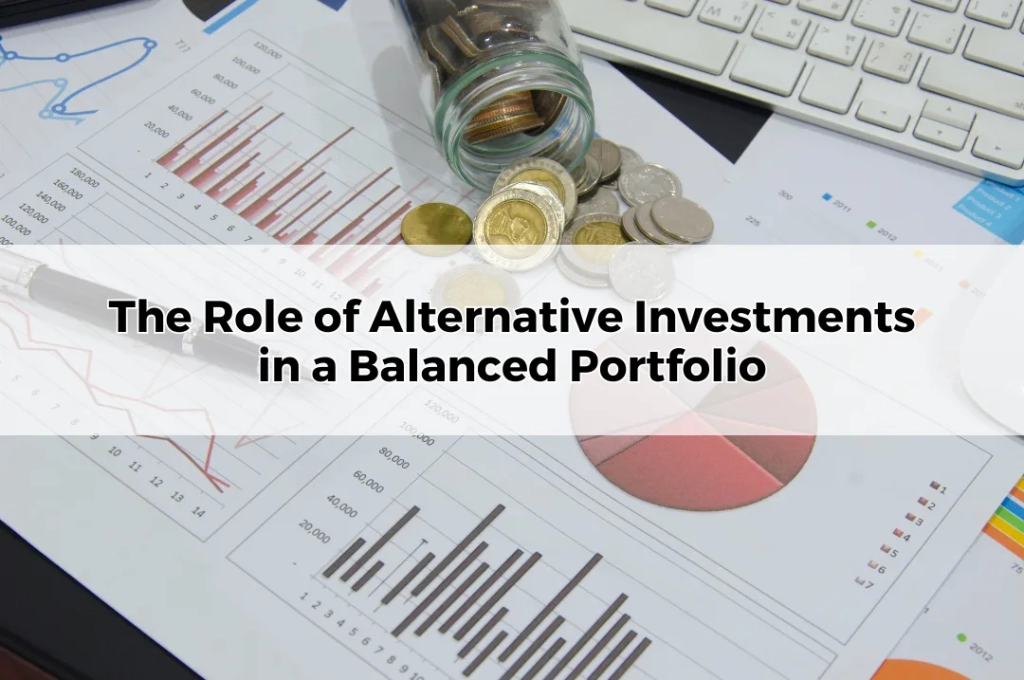The Role of Alternative Investments in a Balanced Portfolio
Table of Contents
ToggleAlternative investments are an increasingly popular asset class for those looking to diversify their portfolios beyond traditional stocks and bonds. These investments include tangible assets like real estate and commodities, as well as financial instruments such as private equity, hedge funds, and venture capital. Understanding their role in financial planning is essential for achieving a balanced and robust investment strategy.
What Are Alternative Investments?
Alternative investments differ from traditional investments in their structure, liquidity, and risk-return profiles. Unlike equities and fixed income securities traded on public markets, alternative assets are often private, less liquid, and carry unique risks and opportunities. This distinction makes them a compelling addition to a diversified investment strategy, offering opportunities that are not commonly found in traditional markets.
These investments range from tangible assets, such as precious metals or real estate, to more niche financial vehicles, like venture capital. Their unique characteristics make them an attractive option for those looking to hedge against market volatility and improve the overall risk-adjusted returns of their portfolio.
The Importance of Diversification
A balanced portfolio is one that mitigates risk by diversifying across various asset classes. Alternative investments contribute to this balance by offering low correlation with traditional markets, reducing overall portfolio volatility. This characteristic is particularly valuable during economic downturns or periods of market uncertainty, where traditional assets may underperform.
By including alternative investments, investors can achieve more consistent performance over time. Diversification doesn’t eliminate risk entirely, but it ensures that a portfolio is not overly reliant on a single asset class, thereby enhancing its resilience against market fluctuations.
Types of Alternative Investments
Real Estate Investments
Real estate provides tangible value and can generate consistent income through rental yields or long-term capital appreciation. It is a preferred choice for many Australian investors due to its familiarity and relatively stable performance. Properties in Toowoomba, for instance, can offer attractive returns while contributing to local economic development.
Commodities
Investments in gold, oil, and other commodities offer a hedge against inflation and economic uncertainty. Commodities are often less correlated with stock markets, making them a stabilising force in a portfolio. Australian investors frequently turn to commodities like iron ore or agricultural products, given their prominence in the national economy.
Private Equity and Venture Capital
These investments provide exposure to high-growth opportunities, albeit with increased risk and longer investment horizons. Private equity involves investing in established businesses that are not publicly traded, while venture capital focuses on funding startups with significant growth potential. Both can yield substantial returns for those willing to accept higher levels of risk and illiquidity.
Hedge Funds
Hedge funds utilise advanced strategies to achieve returns independent of market movements, often focusing on absolute returns. These funds are managed by professionals employing techniques such as short selling, leveraging, or derivatives trading to maximise returns. While they offer potential for significant gains, they also come with higher fees and complexity.
Cryptocurrencies
The digital currency market is gaining traction as an alternative investment due to its decentralised nature and potential for high returns. Cryptocurrencies like Bitcoin and Ethereum have captured investor interest, particularly among younger demographics seeking innovation in their portfolios. However, their volatility and regulatory uncertainties require careful consideration.
Benefits of Alternative Investments
Portfolio Diversification
Adding alternatives reduces exposure to any single asset class, spreading risk effectively. This approach creates a more balanced portfolio that can better withstand market shocks and deliver consistent returns over time.
Enhanced Returns
Certain alternative assets, such as private equity, often outperform traditional investments over the long term. These high-growth opportunities can significantly boost overall portfolio performance when managed effectively.
Inflation Hedge
Assets like commodities and real estate are often effective at preserving purchasing power during inflationary periods. This makes them a vital component for investors seeking to protect their wealth in an inflation-prone environment.
Risks Associated with Alternative Investments
Illiquidity
Many alternatives are not easily converted into cash, which may pose challenges during financial emergencies. Investors should carefully assess their liquidity needs before committing funds to these investments.
Complexity
Alternative investments often require a higher level of expertise to manage effectively. Understanding their unique risks and market dynamics is crucial to making informed decisions.
Higher Fees
Management fees for alternatives, particularly hedge funds and private equity, tend to be significantly higher than traditional investments. This factor can erode returns if not adequately accounted for.
How Alternative Investments Fit Into a Balanced Portfolio
A balanced portfolio incorporates alternative investments in a measured way, aligning with the investor’s risk tolerance, time horizon, and financial goals. For Australian investors, tailoring this balance requires an understanding of local economic trends and opportunities. A Toowoomba financial adviser can provide valuable insights into incorporating alternatives effectively while maintaining alignment with broader financial objectives.
The Role of Financial Advisers in Alternative Investing
A knowledgeable adviser, such as a Master Financial Planning and SMSF Specialist Advisor, can help navigate the complexities of alternative investments, ensuring they complement your broader financial plan. Advisers can offer tailored advice, helping investors select alternatives that align with their unique goals and circumstances. They also assist with ongoing portfolio management to adapt to changing market conditions.
Regulatory Considerations in Australia
Investing in alternatives requires adherence to Australian financial regulations. These regulations ensure investor protection and promote market integrity. It is essential to consult an online financial adviser or a local Toowoomba financial adviser familiar with Australian standards to ensure compliance and optimise investment outcomes.
Conclusion
Incorporating alternative investments into a balanced portfolio can be a game-changer for achieving financial stability and growth. With their potential for diversification, enhanced returns, and inflation protection, they are an invaluable addition to any investment strategy. To explore how alternatives can work for your financial goals, contact a trusted Toowoomba financial adviser for tailored advice.









